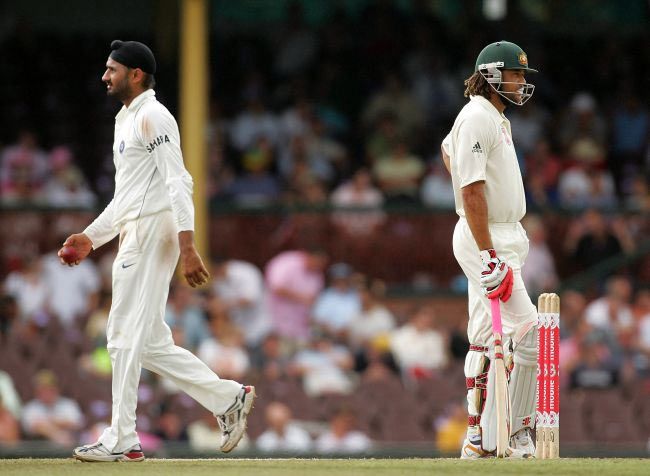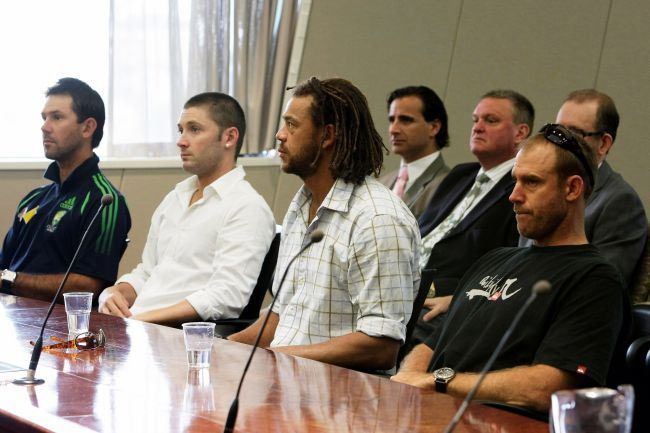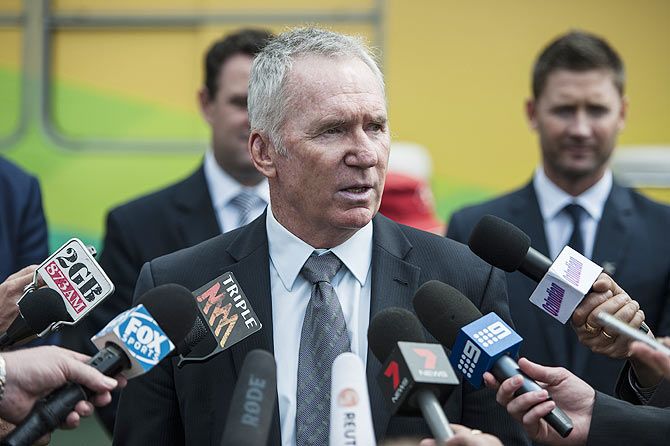
The furore over the infamous Monkeygate row refuses to die down with former Australian captain Allan Border now saying that Cricket Australia should have called India's bluff instead of letting its own players down.
In his upcoming book Cricket As I See It, Border, Australia's 1987 World Cup winning captain, gave his version of the incident involving Indian spinner Harbhajan Singh and Australian batsman Andrew Symonds.
At the peak of the controversy during the 2007-08 series, India had threatened to pull out of the rubber if a three-match ban on Harbhajan was not lifted.
Border also claims in his new book that during the ODI series in India in September-October 2007, Symonds, who was Man of the Series, was racially abused by the crowds in Vadodara and Nagpur and then allegedly by Harbhajan Singh in Mumbai.
After the seventh international of that series, there was a meeting to arbitrate between Harbhajan and Symonds in which the Australians claimed Harbhajan had called Symonds a 'monkey'.
The former skipper has revealed that after the Mumbai problem, the Board for Control of Cricket in India (BCCI) did nothing until the ICC pressured it to take action and in the end, the BCCI merely issued a joint statement with CA condemning racism.

Border says that the Australians felt the matter was over, but then in Sydney, the incident was repeated although Sachin Tendulkar and Harbhajan claimed that the spinner had said 'teri maa ki...' in Hindi, which means 'motherf*****' in English.
"I was on the Cricket Australia board at the time, and we ultimately accepted the ICC appeal finding and moved on, but it's never sat well with me. We hung Andrew Symonds out to dry and at the time I was annoyed about it. I thought 'This isn't right'. Obviously something happened out there," Border wrote in his book, excerpts of which have been released by foxsports.com.au.
He added: "The realisation at board level was that we couldn't have India go home. But morally and ethically we should have called their bluff and hoped the global community would hold them to order...."
Border's book is releasing close on the heels of Sachin Tendulkar's autobiography Playing It My Way, in which the legend wrote about how India were on the verge of calling off the tour after Harbhajan was suspended on allegations of racial abuse.
"We were encouraging -- and the ICC was encouraging -- players to report racial slurs and vilification on the field, but when it actually happened, it went nowhere. It got ugly," Border writes.
Border initially wanted to back Symonds but then went with the board.

"I was torn. Initially, I was all for backing our players, but then the reality hit from a business point of view. We were told we'd have a massive financial hole if the Indians went home, and we couldn't afford it.
"Channel Nine as the broadcaster could sue us for not producing the days of cricket specified by the television-rights contract, and then we'd have to countersue India. India are all-powerful now, so we'd have had no chance.
"Once we were aware of the commercial realities, we knew we had to back down a bit. Andrew Symonds was aggrieved, and it affected him deeply. His cricket suffered from then on, and I think that was the start of it."
Symonds had said that he thought CA was intimidated by the Indian cricket board, and added that the thing, he thinks, that was grinding on him the most was the lying because the allegation was that this hadn't happened, and it had.
Border said that the Monkeygate also "hastened his departure" from the cricket board.
"That incident also hastened my departure from the board a little. The backroom deals were done, and I was out of my depth. They made the commercial decision, not the ethical/moral decision. Would India have actually stayed or gone home if we'd stood up to them? If they'd gone home, we'd at least have had the moral high ground."











